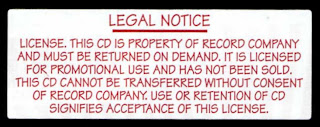 Oh the gravy train how sweet it is. The record labels give free copies of almost any release to radio stations (also to retail press etc). The tradition is as old as radio, while the some try to argue the opposite presently, at least historically RADIO SELLS RECORDS. So record labels are very willing to create ample opportunity for airplay, not just with the traditional gifts of booze, drugs and money but also with items of actual promotional value such as concert tickets and extra copies of a release.
Oh the gravy train how sweet it is. The record labels give free copies of almost any release to radio stations (also to retail press etc). The tradition is as old as radio, while the some try to argue the opposite presently, at least historically RADIO SELLS RECORDS. So record labels are very willing to create ample opportunity for airplay, not just with the traditional gifts of booze, drugs and money but also with items of actual promotional value such as concert tickets and extra copies of a release. I was lucky with this Decca promo. not only to I have the artist title and release date, I have a hand written date that preceeds it's commercial release by a few months.
Around the mid 1980s labels began to punch out, mark, stamp, or cut-out their stock for promo. It lowered costs, but they are uninteresting to collectors in general. Of course this has another side effect. Selling them used has become all the easier. Thus creating a secondary market in used goods for which the label was never paid a retail margin. So did it actually save them any money? Nope. They were better off before with the clearly marked promo copies as below. This Bishop example is interesting because they were a pressing plant and not a label. They pressed for Session and SD records.




No comments:
Post a Comment